Medical expert of the article
New publications
Preparations
Ointments for bedsores
Last reviewed: 03.07.2025

All iLive content is medically reviewed or fact checked to ensure as much factual accuracy as possible.
We have strict sourcing guidelines and only link to reputable media sites, academic research institutions and, whenever possible, medically peer reviewed studies. Note that the numbers in parentheses ([1], [2], etc.) are clickable links to these studies.
If you feel that any of our content is inaccurate, out-of-date, or otherwise questionable, please select it and press Ctrl + Enter.
Bedsores occur in many patients and are considered to be a rather severe consequence of many diseases that are accompanied by prolonged immobilization of a person. As a rule, in 70% of cases they occur in elderly patients.
A special ointment for bedsores helps improve blood supply to tissues, heal the skin surface, and wash away necrotic masses from wounds.
Indications decubitus ointments
As a rule, ointments are recommended for the treatment of bedsores of all stages. At the first stage, various means help to slow down the development of the infectious process in the wound, improve blood circulation in the wound. If the patient has already started the second stage of bedsores, then it is worth paying attention to the means intended for drying wounds. For the third and fourth stages, ointments are selected to clean ulcers and get rid of pus.
Release form
Among the most popular means for treating bedsores, ointments occupy a special place, because they have many advantages:
- They speed up the wound healing process.
- They have a relatively low cost.
- Improve tissue trophism.
- They help eliminate pain and other unpleasant sensations.
- I have a bactericidal effect, eliminating pathogenic bacteria.
Names of ointments for bedsores for bedridden patients
Solcoseryl. A product designed to improve tissue trophism and regeneration. The active ingredient is considered to be deproteinized dialysate, which is obtained from the blood of young healthy calves.
Apply the preparation only to the damaged skin areas. It is necessary to clean the wounds before using the preparation. Apply to the skin evenly in a thin layer twice a day (possibly three times on the recommendation of a specialist). The therapy lasts until the bedsores heal.
If you are prone to allergic reactions and do not tolerate the components of the product, you should not apply it. Not recommended for pregnant women. Rarely, but there may be side effects in the form of marginal dermatitis or urticaria.
Algofin. The ointment is based only on natural components: fatty acid salt, chlorophyll derivatives, film formers and carotenoids. The ointment has a strong anti-inflammatory effect and also stimulates tissue regeneration.
Apply only to the skin with wounds, without touching the healthy surface; if necessary, a tampon or bandage can be used.
Some patients feel a burning sensation in the area of application during Algofin therapy. There are no contraindications for use, the ointment is recommended even for pregnant women.
Methyluracil. The active ingredient of the drug is dioxomethyltetrahydropyrimidine, which restores nucleic acids. The ointment promotes rapid regeneration of damaged tissue.
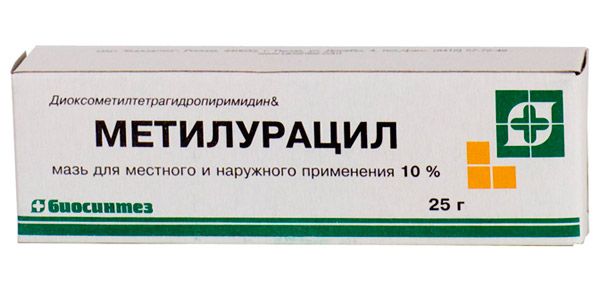
The dosage for treatment is determined by the doctor in accordance with the individual symptoms of each patient. If you have a predisposition to the development of allergic reactions and individual intolerance to the substances that form the basis of the drug, its use is contraindicated. Some patients complain of an allergy to methyluracil as a side effect.
Mefenate. The drug is based on the following active ingredients, which are used in the treatment of bedsores, are mefenamin sodium salt and vinylin.
The ointment is applied only to the skin where there are bedsores using a special spatula, usually once a day (but it can be applied up to three times in 24 hours). The duration of therapy is approximately fifteen days. If the treatment needs to be continued, further therapy is carried out under the supervision of a doctor. The product can be applied under a bandage.
The only contraindication: individual intolerance. Some patients may experience: irritation, allergy, swelling, slight numbness.
Alantan Plus. The preparation is based on two active substances: allantoin and dexpanthenol. Due to this composition, the ointment has a healing effect, cleanses wounds from unnecessary keratin deposits, and stimulates regeneration.
It is recommended to apply from one to several times a day. The dosage is prescribed by the doctor. The therapy continues until the symptoms disappear and the wound is completely healed.
The product is not recommended for use by patients who suffer from frequent allergies, especially to dexpanthenol and allantoin. Sometimes during therapy with this product the following may occur: allergy, skin hypersensitivity.
Bedsores ointment with silver
Ointments containing silver are usually used to treat first-stage bedsores. The most popular of these are the following preparations.
Dermazin. A product that has an antibacterial effect. The active ingredient in the product is silver sulfadiazine.
The ointments can be applied under a bandage or without it in a thin layer twice a day until complete healing. When using a bandage, it should be changed daily (possibly several times).
The drug should not be applied to patients with intolerance to its main substances, up to one year, during childbirth. Sometimes the use of the product may cause: itching, burning, allergy.
Sulfargin. Has an antibacterial effect. The active ingredient is silver sulfadiazine. Has a bactericidal effect against many gram-negative and gram-positive bacteria (Klebsiella spp., Escherichia coli, Staphylococcus spp., Proteus spp., etc.).
Be sure to remove pus and necrotic masses before using this drug. Use once or twice a day under a bandage or without a bandage. Lubricate the affected areas with a thin layer. The duration of treatment is determined by the doctor. Usually - not less than 3 weeks.
The product may cause unpleasant consequences if used to treat pregnant women, small children (up to one year), patients with intolerance to the components. Sometimes, rarely, side effects develop: digestive disorders with the development of diarrhea or constipation, nausea and vomiting, leukopenia, pain, burning of the skin, allergies.
Argolsulfan ointment
The drug is based on the active substance antibiotic - sulfathiazole. Due to this, the growth of pathogenic organisms and their reproduction are suppressed. Additionally, the ointment also contains silver ions, which help to enhance the main characteristics of sulfathiazole.

The drug has a pain-relieving effect. You can use a bandage if necessary. Apply a thin layer to the bedsores several times a day. The treatment continues until all wounds disappear.
The limitation for using the ointment is intolerance to its main ingredient. It cannot be used to treat small and premature babies. Side effects from using the drug: unpleasant sensations on the skin (burning, itching), allergies.
Stellanin ointment
The product has antimicrobial, anti-inflammatory, regenerative effects. The active ingredient at the heart of the product is diethylbenzimidazolium triiodide.
When applying the ointment, make sure that its layer covers the bedsores completely. The duration of therapy and dosage are individual and depend on the stage of the wound process. Can be used under a bandage.
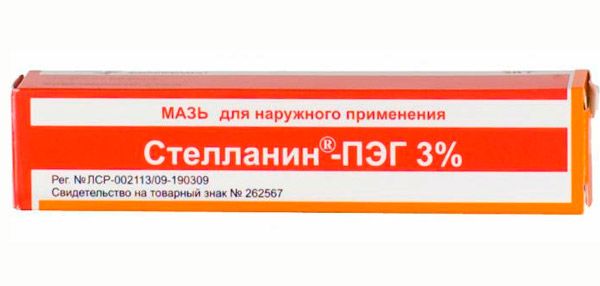
The drug is contraindicated in: thyrotoxicosis, acute liver failure, for the treatment of pregnant women and small children (under one year of age). Some patients who used the drug noted that they developed an allergy, the skin often itched and burned.
Zinc Ointment
Dermatoprotective agent, which contains the active component - zinc oxide. It has a fairly well-defined anti-inflammatory effect.
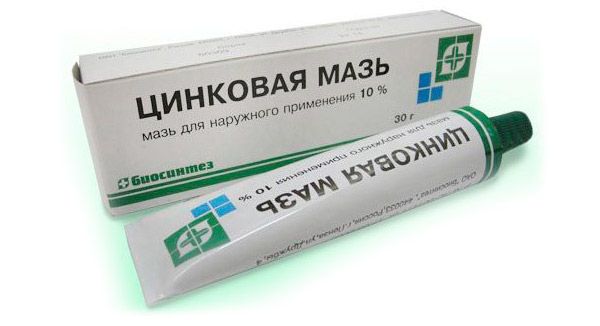
For treatment, the ointment is applied in a thin layer to the bedsores once or twice every 24 hours. The doctor may increase the dose if necessary. The therapy lasts until the wounds are completely healed.
The product can be used by almost everyone, unless you are allergic to zinc. Sometimes patients note that the use of the ointment leads to the appearance of unpleasant symptoms: swelling of the skin, itching of the skin and other allergic reactions.
Vishnevsky ointment
The active ingredients of this product are: xeroform, birch tar, castor oil. The ointment is actively used to treat wounds, ulcers, teenage acne, furunculosis, psoriasis, bedsores in bedridden patients.
When treating bedsores, the ointment should be applied in a thin layer only to the affected areas of the skin. In this case, the wounds must first be disinfected. The therapy is individual, so the dose and duration are usually prescribed by a doctor.
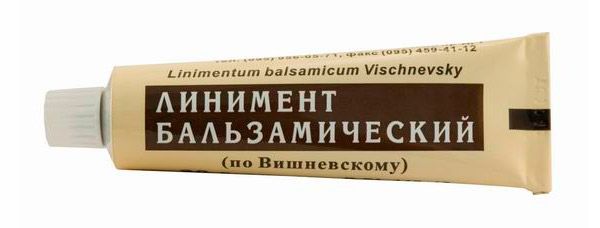
The drug is contraindicated for use in case of intolerance to at least one of its main components. The main side effects include: allergic reactions (itching, hyperemia of the skin, burning, irritation).
Sulfur ointment
The active ingredient of the drug is sulfur. The product has antiparasitic and antimicrobial effects. It is actively used to treat acne, as well as for the treatment and prevention of bedsores in bedridden patients.
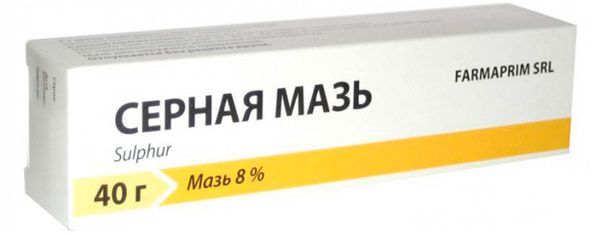
The drug can be used from the age of three. Apply to the affected areas of the skin in small quantities two or three times a day. The therapy continues until the wound heals.
The ointment is contraindicated for use in case of intolerance to its main component. It also cannot be used for treatment in early childhood and during pregnancy.
Among the main side effects from using the product, it is worth highlighting: allergic reactions (burning, itching, swelling).
Ointments for bedsores made in Germany
Recently, more and more new products for effective treatment of bedsores have appeared in pharmacies. One of such preparations is the German ointment "Braunodin".
This is an antiseptic and disinfectant, the active component of which is povidone-iodine. It is active against a wide range of fungi, bacteria (including tuberculosis mycobacteria), and viruses.
The dosage is completely individual and is prescribed by the attending physician in accordance with the severity of the patient's condition.
The ointment is contraindicated for use in hyperthyroidism, renal failure, thyroid adenoma. Also, the ointment cannot be used during pregnancy, breastfeeding, or if there is intolerance to its components.
Side effects include hyperemia and burning, if they occur, therapy should be discontinued.
Pharmacodynamics
Let's consider the pharmacodynamics and pharmacokinetics of anti-bedsore ointments using the popular drug "Algofin" as an example.
The ointment is created using only natural, natural components, so it is completely safe for the patient's health. It has an antimicrobial effect on most anaerobic and aerobic bacteria (staphylococci, streptococci, peptococci, Pseudomonas aeruginosa, clostridia), as well as Candida fungi.
It also has anti-inflammatory, stimulating, regenerative, and reparative effects. It reduces swelling of affected tissues, due to which they are cleared of necrotic masses and heal faster.
Dosing and administration
The dosage is often individual and depends on the severity of the disease and its stage. As a rule, the ointment is applied at least twice a day in small quantities. Sometimes it is necessary to disinfect and clean the wound before use.
Making ointments for bedsores at home
Traditional medicine offers several effective ointments that can be prepared at home. Here are some of the most popular recipes.
- Take equal amounts of vodka and olive oil. Mix to form a viscous consistency and rub the affected areas of the skin 2-3 times a day. The therapy lasts from ten to twelve days.
- Take one tablespoon of calendula (dried flowers) and grind it using a coffee grinder. Mix with Vaseline (50 g). Apply 1-2 times a day to the affected skin until the wounds are completely healed.
- Take 100 g of any vegetable oil (preferably olive oil), a small piece of beeswax. Stir to obtain a homogeneous mass and cool. Lubricate the bedsores with the resulting ointment several times a day.
- Take two tablespoons of olive oil, add two finely chopped onions. The ingredients must be boiled on low heat for 20-25 minutes. After that, add half of a melted church candle. Apply to the affected skin two or three times a day.
- Take 200 g of beeswax, 20 onion slices with husks, spruce sulfur, one liter of olive oil. Combine all the ingredients of the ointment, except for the onion, and cook on low heat for half an hour. Then add the onions and cook for another 40 minutes. Cool, strain and apply to the skin.
 [ 17 ], [ 18 ], [ 19 ], [ 20 ], [ 21 ]
[ 17 ], [ 18 ], [ 19 ], [ 20 ], [ 21 ]
Ointments for the prevention of bedsores
The most effective drug for the prevention of bedsores is the ointment "Actovegin".
The active ingredient of the drug is a substance obtained from the blood of young calves (deproteinized hemoderivative). It does not contain toxic components. Due to its composition, the product helps to accelerate tissue healing. That is why this ointment is often used to prevent and treat bedsores.
To prevent bedsores, the ointment is applied in a thin layer to the skin of the patient lying down, a bandage is applied, which must be changed daily (three to four times). The drug is well tolerated by both adults and children. It is contraindicated to use the product if there is an intolerance to its main components. Among the main side effects, only allergies are distinguished. It is permissible to apply the ointment during pregnancy, but only on the recommendation of the attending physician.
Contraindications
Most ointments for the treatment and prevention of bedsores are safe for patients, so the only contraindication to their use is intolerance to the components. Also, you should not use such drugs during pregnancy without a doctor's recommendation. If you are prone to various allergic reactions, you should apply ointments with caution.
Some ointments have other contraindications: childhood, liver failure, hyperthyroidism. Before use, be sure to carefully read the instructions.
Shelf life
The shelf life of such drugs is usually three to five years. It is not recommended to use the ointments after this period.
 [ 24 ]
[ 24 ]
Attention!
To simplify the perception of information, this instruction for use of the drug "Ointments for bedsores" translated and presented in a special form on the basis of the official instructions for medical use of the drug. Before use read the annotation that came directly to medicines.
Description provided for informational purposes and is not a guide to self-healing. The need for this drug, the purpose of the treatment regimen, methods and dose of the drug is determined solely by the attending physician. Self-medication is dangerous for your health.

